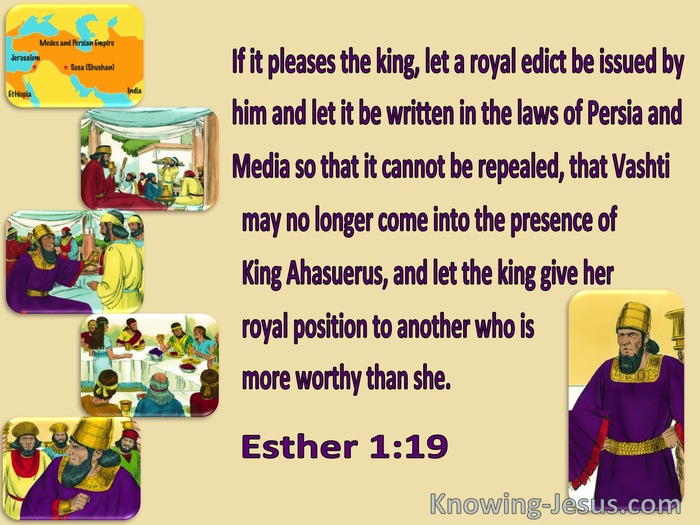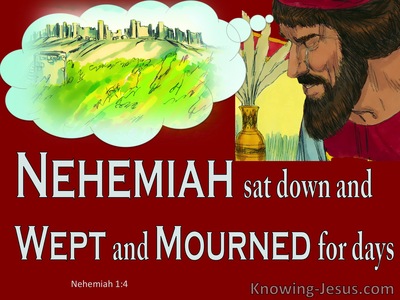◄ What Does Esther 1:19 Mean? ►
"If it pleases the king, let a royal edict be issued by him and let it be written in the laws of Persia and Media so that it cannot be repealed, that Vashti may no longer come into the presence of King Ahasuerus, and let the king give her royal position to another who is more worthy than she.
Esther 1:19(NASB)

Verse of the Day
The first chapter of Esther lays the foundation for the thrilling story that follows, where a satanic scheme to slaughter the entire Jewish nation is thwarted. This planned genocide was discovered and reversed through faithful servants of God whom the Lord used to save His people from destruction, and to carry forward His eternal plan of redemption.
Ahasuerus, who was also known as Xerxes 1st, succeeded his father, Darius, onto the Persian throne. His empire stretched from India to Ethiopia and in the 3rd year of his reign, this great emperor decided to display his lavish wealth and spoils of war for 180 days. He then threw a massive, 7-day celebratory feast in his great winter palace at Suza.
He invited all the princes and nobles who governed his 127 provinces, and all the local citizens to the feast. On the final day, the inebriated king ordered his beautiful wife, Vashti, to join the party so she could show off her beauty to the men. And so, 7 eunuchs were sent to fetch her.
The queen, who was involved in a feast with her own guests, refused to attend. There are many who speculate as to why, but the reason is unclear. However, her refusal embarrassed and angered the king, and rather than letting the incident pass, he called his wise men to ascertain what he could do about her obstinate behaviour, and asked what laws he could use to teach her a lesson.
The king's reaction was excessive, for no self-respecting woman would want to be exhibited in this way before a drunken group of rowdy men. Nevertheless, he agreed to his advisor's recommendation to depose his queen and make a search throughout the kingdom for a beautiful young virgin to replace her. These wicked men knew there was no wrongdoing by the queen and no Persian law that condemned her, yet they used this opportunity to their own advantage and did not tell the truth.
And so, in the midst of all the feasting and festivities, the inebriated king was manipulated into deposing Vashti his queen, and making a search for another woman to take her place: "If it pleases the king," they suggested enticingly, "let a royal edict be issued by him and let it be written in the laws of Persia and Media so that it cannot be repealed, that Vashti may no longer come into the presence of King Ahasuerus, and let the king give her royal position to another who is more worthy than she."
There are so many lessons that can be learned from this introductory chapter. This pagan king seems devoid of wisdom, appears to be willingly deceived by these sycophantic men, was easily manipulated into doing evil, and gives the appearance of being a drunken bully. The lack of a law that enabled the king to carry out his ungodly whim to depose his wife, caused his advisors to take the law into their own hands and create an unrighteous law that addressed the issue at hand. Their crafty move to ingratiate themselves to the king to elevate their status in the court, is quickly exposed to those with eyes to see.
At the end of the chapter, we see the king's counsellors twisting the truth to make their suggestion even more appealing to the king. They added to the unchangeable laws of the Medes and Persians, in order to authorise their unlawful plan and influence the weak-willed king by pandering to his fleshly desires. They did this by falsely suggesting that the queen's refusal to attend his banquet would cause every woman in the land to rebel against their husbands. And, in turn, the king seemed willing to adopt the foolish assumption of his 'wise men' rather than recognising his fault and acting more appropriately.
Right thinking, appropriate behaviour, wisdom, and lawful conduct, was replaced with scheming, lies, deceit, and lawlessness so that each person in the 'royal edict' could pander to their own little lustful leanings; the lust of the flesh, the lust of the eye, self-centred pride, and manipulation.
My Prayer
Heavenly Father, thank You for the many lessons I can learn from the little book of Esther and the many ungodly actions and attitudes that it exposes. Give me discernment to recognise those that seek to manipulate others through deceit and lies. Keep me from the destructive lusts of the flesh, the lust of the eyes, and pride. Help me eschew the evil and seek only to do that which is righteous in Your eyes. Lead me in the path of righteousness for Your name’s sake. In Jesus' name I pray, AMEN.

Choose a Verse from Esther 1
Esther 1:19 Further Study
- Esther 1:19 in the Parallel Bible
- Esther 1:19 in the Thematic Bible
- Esther 1:19 Cross References
- Esther 1:19 Treasury of Scripture Knowing
- Esther 1:19 Sermons
- Esther 1:19 Prayers
- Esther 1:19 Images
- Choose Chapter
Never miss a post













